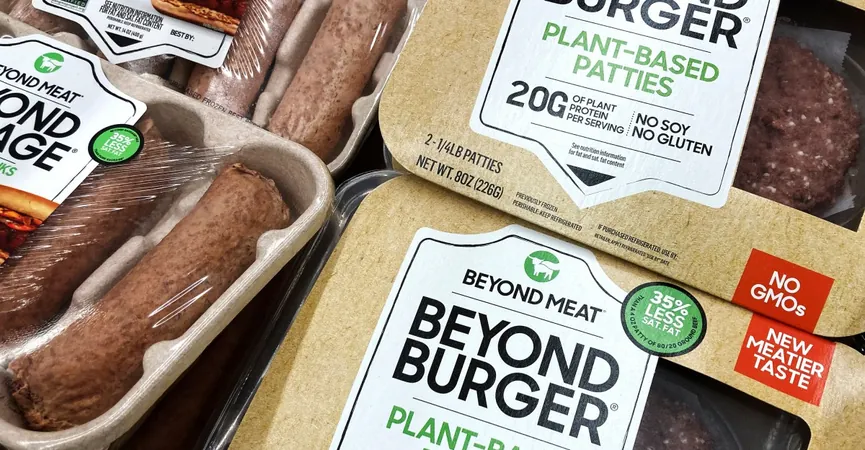
The Truth Behind the Myths: Are Plant-Based Burgers Really Bad for Your Heart?
2024-12-19
Author: Sarah
Introduction
This summer, a sensational story swept through major news outlets, alarming the public with claims that eating plant-based burgers could lead to heart disease. An article from the Washington Post, for instance, purported that "new research" revealed a direct link between ultra-processed plant foods—including popular meat substitutes, juices, and pastries—with significant health risks such as heart attacks and strokes.
The Flawed Study
However, the troubling narrative was deeply flawed.
The notion was based on a study conducted by a team of nutrition researchers from the University of São Paulo and Imperial College London, which analyzed dietary habits of over 118,000 people in the UK. The findings indicated that increased consumption of ultra-processed plant foods was correlated with higher instances of cardiovascular disease and early mortality. Conversely, diets rich in whole, non-ultra-processed foods like fruits and vegetables were associated with better health outcomes.
Limited Representation of Plant-Based Meats
Critically, plant-based meat alternatives were barely represented in this research. A mere 0.2 percent of the total caloric intake came from these products. The excess caloric intake from ultra-processed sources predominantly stemmed from industrial products such as packaged breads, pastries, and cookies—far removed from the trendy vegan burgers we see on grocery store shelves today. Additionally, the newer brands, like Impossible and Beyond Meat, weren't even available during the study's data collection period between 2009 and 2012.
Fernanda Rauber, a lead author of the study, confirmed in an email, "With such a small contribution, we can’t draw any meaningful conclusions about plant-based meat alternatives specifically." It raises a significant question: Why the media’s fixation on plant-based meats?
Broader Discussions on Ultra-Processed Foods
The issue extends beyond this particular study, intertwining with broader discussions surrounding ultra-processed foods (UPFs) in nutrition science—a rapidly evolving field aimed at categorizing packaged foods often laden with ingredients not typically found in home kitchens. Public figures like Robert F. Kennedy Jr. and Bernie Sanders have declared their intentions to regulate UPFs, painting a picture of plant-based meats as tools of corporate manipulation in our food systems.
Despite these issues, a recent scientific review concluded that there is minimal evidence supporting the health impacts of UPFs and that many studies lack thorough design. Public anxieties around ultra-processed foods have surged in recent years, driven by concerns about industrialized food production affecting our health and well-being. As Aviva Musicus of the Center for Science in the Public Interest stated, "It really responds to this feeling that a lot of consumers have, which is that the food industry is not protecting their health."
The Confusion of UPFs and Nutritional Science
While it's evident that parts of the American food landscape are indeed unhealthy and contribute to rising disease rates, labeling ultra-processed foods broadly leads to confusion. Some experts argue that the criteria for classifying foods as "ultra-processed" is overly vague and potentially misleading, potentially deterring consumers from healthier, eco-friendly plant-based options.
Misinterpretations surrounding UPFs can indeed confuse both journalists and consumers. For example, a press release from Imperial College aptly highlighted plant-based burgers but tasted scrutiny due to its lack of context regarding their minimal representation in the overall dietary patterns studied.
The Classifications of Foods
The classification system itself, developed from the Nova framework, groups foods based on processing levels—from minimally processed fruits to complicated industrial formulations. Surprisingly, the study's classification included healthy options like tofu and tempeh in the ultra-processed category, despite their long-standing culinary use in Asia. This categorization points to inconsistencies that have led to bewilderment among nutrition experts about the applicability and reliability of the ultra-processed classification.
Many nutritionists, including Harvard’s Walter Willett, have noted that lumping together vastly different food products could obscure the true risks and benefits associated with them. For example, while some ultra-processed items like sugary snacks may be unhealthy, this doesn’t necessarily reflect the same conclusion for healthier alternatives like plant-based meats, which provide a protein option that is often more environmentally sustainable than traditional meat.
The Benefits of Plant-Based Options
Furthermore, companies like Beyond Meat, which have reformulated their products to include healthier fats, like avocado oil, offer nutritional profiles that significantly outperform that of conventional beef in terms of saturated fat and nutrient density.
Conclusion
In reality, it may be beneficial to prioritize minimally processed foods over ultra-processed ones, yet there's no need for fear around consuming plant-based burgers. Most consumption should focus on variety and balance rather than unfounded fearmongering.
In conclusion, while the sentiment against ultra-processed foods resonates with many, the blanket demonization of all such products risks undermining the broader discussions about health, sustainability, and ethical consumption. The reaction toward plant-based alternatives isn’t just rooted in health but often comes from deeper discomfort with a changing food landscape. Proper research and transparency can help align public understanding with nutritional science, rather than letting fear guide dietary choices. There’s no harm in enjoying plant-based options as part of a balanced diet, and as more research surfaces, clearer insights can lead to smarter, healthier food decisions for everyone.



 Brasil (PT)
Brasil (PT)
 Canada (EN)
Canada (EN)
 Chile (ES)
Chile (ES)
 España (ES)
España (ES)
 France (FR)
France (FR)
 Hong Kong (EN)
Hong Kong (EN)
 Italia (IT)
Italia (IT)
 日本 (JA)
日本 (JA)
 Magyarország (HU)
Magyarország (HU)
 Norge (NO)
Norge (NO)
 Polska (PL)
Polska (PL)
 Schweiz (DE)
Schweiz (DE)
 Singapore (EN)
Singapore (EN)
 Sverige (SV)
Sverige (SV)
 Suomi (FI)
Suomi (FI)
 Türkiye (TR)
Türkiye (TR)